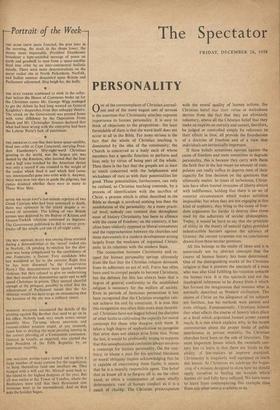PERSONALITY
NE of the commonplaces of Christian journal-
r%
ism and of the more august sort of sermon is the assertion that Christianity attaches supreme importance to human personality. It is easy to think of objections to the proposition ; the least formidable of them is that the word itself does not occur at all in the Bible. Far more serious is the fact that the whole of Christian teaching is dominated by the idea of the community; the Church is conceived as a body each of whose members has a specific function to perform and lives only by virtue of being part of the whole. Then there is the fact that the gospels are at least as much concerned with the helplessness and wickedness of men as with their potentialities for good. These potentialities, furthermore, can only be realised, so Christian teaching contends, by a process of identification with the sacrifice of Christ, a process which is often described in .the Bible as though it involved nothing less than the annihilation of the personality. At a more practi- cal level, nobody can contend that throughout most of history Christianity has been in alliance with the cause of freedom; on the contrary, it has often been violently opposed to liberal movements and the rapprochement between the churches and these movements is a modern development arising largely from the weakness of organised Christi- anity in its relations with the modern State.
The connection between Christianity and re- spect for human personality springs ultimately from the fact that the Christian religion demands from its adherents an act of will. Force has often been used to compel people to become Christians, but the defence for this has always been that a degree of general conformity to the established religion is necessary for the welfare of society. Even in periods of ferocious persecution it has been recognised that the Christian evangelist can- not achieve his end by constraint. It is true that this recognition was often little more than theoreti- cal; Christians have not lagged behind the disciples of other faiths in cultivating the capacity for moral contempt for those who disagree with them. It takes a high degree of sophistication to recognise that error does not always arise from vice. None the less, it would be profoundly wrong to suppose that this unsophisticated confusion always involves a contempt for human personality. On the con- trary, to blame a man for his spiritual blindness or moral obliquity implies acknowledging that he is capable of overcoming these faults; it means that he is a morally responsible agent. The belief that to know all is to forgive all is, on the other hand, as often a consequence of some wholly deterministic view of human conduct as it is a result of charity. The Christian preoccupation with the moral quality of human actions, the Christian belief that their virtue or wickedness derives from the fact that they are ultimately voluntary, above all the Christian belief that they make an imprint on eternity and cannot, therefore, be judged or controlled simply by reference to their effects in time, all provide the foundations of a doctrine of freedom and of a view that individuals are intrinsically important.
If these beliefs sometimes operate against the cause of freedom and seem sometimes to degrade personality, this is because they carry with them the faith that in the last resort no amount of com- pulsion can really suffice to deprive men of their capacity for free decision on the questions that ultimately matter. In times of turbulence, Christ- ians have often treated invasions of liberty almost with indifference, holding that there is no set of material circumstances which makes salvation impossible; but when they are not engaging in this kind of sophistry, they bring to the cause of free- dom arguments far harder to destroy than those used by the adherents of secular philosophies. Today, it would be hard to say that the principle of utility or the theory of natural rights provided indestructible barriers against the advance of tyranny; the current tyrannies rest on conclusions drawn from these secular premises.
All this belongs to the realm of ideas and it is notoriously not by abstract concepts that the course of human history has been determined. One of the distinguishing marks of the Christian religion is that it presents the spectacle of a man who was also God fulfilling his vocation towards the human race. It is this spectacle and not the theological inferences to be drawn from it which has formed the imagination that sustains what is normally described as Western civilisation. The claims of Christ on the allegiance of his subjects are limitless, but his methods were patient and even oblique. Fundamentally, Christians believe that what affects the course of history takes place at a level which organised human power cannot reach. It is this which explains why, in the recent controversies about the proper limits of public interference in private morality, the Christian churches have been on the side of liberalism. The most important lesson which the twentieth cen- tury has to learn is that there are limits to the ability jf law-makers to improve mankind. Christianity is singularly well equipped to teach this lesson. At Christmas we celebrate the begin- ning of a mission designed to show how we should apply ourselves to healing the wounds which human sin and folly have inflicted. We have more to learn from contemplating this example than from any other source available to us.


























 Previous page
Previous page